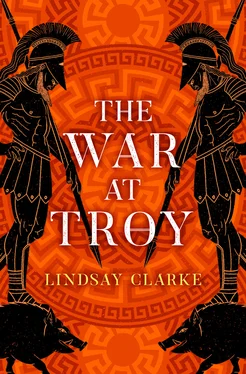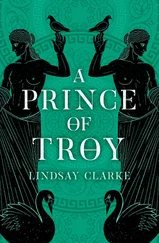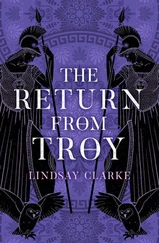From the moment that his ship put in on the strand below the high rock where the castle of Lycomedes perched, facing the sea one way and the little town the other, it was clear that Odysseus would not receive a warm welcome on Skyros. The Dolopians had kept open their channels of communication with the mainland and they knew why he was coming. Odysseus was courteously prevented from seeing Achilles while Lycomedes reminded his guest that his people had chosen a different destiny from that of the other Thessalians and had no wish to become embroiled in a war which was none of their concern. Odysseus answered that he respected the choice they had made, but Achilles son of Peleus was no Dolopian. He was the sole heir to a great king in Iolcus who now required him to take up his royal duties and lead the Myrmidons to the war at Troy.
At that moment their conversation was interrupted by a woman’s voice from the back of the draughty hall.
‘A man’s destiny is not determined only by the claims of his father.’
Odysseus turned to look at a tall, stately woman wearing a dark green robe shot through with colours like a peacock’s tail. The derision in her voice was matched by the cold hauteur of her gaze. She must, Odysseus thought, have been very beautiful once, but those fiercely hooded eyes were more likely to exact obedience these days than adoration. He sensed at once that King Lycomedes was deeply in awe of her.
Beginning to understand for the first time why Peleus had found it so hard to deal with his wife, Odysseus declared himself honoured to have met Thetis at last, having already heard so much about her.
‘But only from those who slander me,’ she said.
‘From those who respect your power, madam.’
‘If that is true then you must know that I will not willingly give up my son again.’
‘And if you are truly his mother,’ Odysseus answered quietly, ‘you will leave him free to choose for himself – as his father did.’
Thetis made a dismissive gesture with a heavily ringed hand. ‘Achilles has already chosen. On this island he has learned the beauty of what he has hitherto been denied – the wisdom and consolation that is to be found only in the loving service of womankind. He is the chosen one of Deidameia, the daughter of King Lycomedes, and has already fathered a son on her. He has made his life here and is content with it. So go and fight your man’s war if you must. My son wishes only to be left in peace.’
‘I might believe it,’ Odysseus said, ‘if I were to hear it from his own lips.’
The lamplight cast a shadow on the hollows of Thetis’s gaunt cheeks. An emerald necklace glistened at her throat. ‘Achilles is preparing to take part in the spring rite tomorrow,’ she answered coldly. ‘He has no desire to see you.’
‘But he knows that I’m here?’
‘He has no need to know.’
‘Surely that too is for him to decide?’
Thetis merely shrugged and glanced away.
‘If you are not afraid of me,’ Odysseus said, ‘you will tell him that the friend who made it possible for him to come to Skyros wishes to speak with him.’
‘I have no fear of you, Ithacan.’
Odysseus smiled. ‘Then tell your son that I also bring word from his friend Patroclus. Perhaps he will speak to me when the rites are done.’
Odysseus was excluded from the inner mystery of the rite that took place on Skyros the next day but they could not keep him from joining the crowd that witnessed the procession afterwards. After hours of waiting in the sunlight he heard the clangour of approaching bells, and then the crowd were shouting and singing. His heart jumped as the procession rounded a corner of the narrow street and he was looking up at the huge, bear-like figure of a man hooded and caped in sheepskins, and with no face – for beneath the hood dangled only a featureless shaggy mask made from the flayed skin of a goat-kid. The man carried a shepherd’s crook, and around his waist and hips were tied row upon row of goat bells which clattered and jangled as he danced along the street with a curious swinging amble designed to make all his bells ring. At his side danced what Odysseus took to be the veiled figure of a maiden wearing long, flounced skirts, but as more and more such figures appeared, he realized that these were in fact young men dressed in maiden’s clothing.
Among them ran other, more comical figures holding long-necked gourds with which they made obscene gestures to the delight of the old women in the crowd. The air began to stink of wine and sweat. The din made by hundreds of bells was painful on his ears. But he was caught up in the noisy tumult of the cavalcade, wanting only to drink and dance and give himself over to the frenzy of the god. And then he became aware of one of the female figures faltering in the dance to stare at him with a shocked look of recognition, and he knew that hidden behind those veils and flounces stood the suddenly discomfited figure of the young man he had come to fetch from the island.
They talked together that night. Odysseus allowed Achilles space to tell about the life he had made on Skyros, of his love for Deidameia and their little son, whom they had called Pyrrhus because of his reddish-blond hair. He talked of the warm sense of return and homecoming he had found among his mother’s people, and how Thetis herself had supervised his initiation into mysteries that had previously lain beyond the reach of his gauche, juvenile emotions. He claimed that never in his life – not even in the years at Cheiron’s school – had he felt so at peace.
Odysseus listened with the kind of patience and sympathy that Achilles had never found in his father. He said that he was deeply glad that Achilles had found peace and joy at last. He said that he understood very well the things that the youth had been trying to tell him because he had known such a tranquil life himself on Ithaca. He too had a beloved wife. He too had a small son who was the delight of his life, and he knew how such things changed a man for the better.
‘Then why have you left them?’ Achilles asked.
‘Because I am a man and I gave my word at the swearing of the oath at Sparta.’
Odysseus watched as the intense young man across from him frowned and shook his head. Then he added almost casually. ‘Your friend Patroclus will go to the war at Troy for the same reason.’
‘Patroclus is going to the war?’
‘Of course. He was among those who contended for Helen’s hand. He took the oath and will honour it – though that’s not the only reason he will fight, of course. He and the rest of the Myrmidons are eager for the battle. They know that it will be the greatest war that has ever been fought in the history of the world. They know that there is such honour to be won there as will be sung of by the bards for generations to come. Even as I speak, a huge army is gathering not far from here at Aulis, on the other side of Euboea. Thousands upon thousands of men are arriving by land and sea. The harbour will be crowded with ships. All the great heroes of the age will be there – Agamemnon, Menelaus, Diomedes of Tiryns, Ajax and Teucer, Nestor of Pylos, Idomeneus of Crete and countless others. Everyone who cares about the glory of his name.’
Odysseus smiled and shook his head as though amazed by the wonder of the thing. He allowed time for Achilles to respond but when the youth said nothing, he added, ‘Your friend Patroclus wouldn’t want to be left out of a gathering like that even if he wasn’t bound by his given word.’
After a moment Achilles said, ‘Did he not ask if I would come?’
Odysseus shrugged. ‘He presumed that you would lead the Myrmidons – particularly as your father is in no shape to fight these days. Phoenix thought so too.’ He looked up into the uneasy gaze across from him. ‘But then they don’t know how content you are here among these shepherds on Skyros.’ Odysseus sighed. ‘I could almost envy you, Achilles, knowing that you have a long and peaceful life ahead of you untroubled by the din of battle and the tumult of the world with its lust for deathless fame.’ As though a new thought had occurred to him, the smile became a frown. ‘Your father is bound to be disappointed. He was sure you would take his ashwood spear to Troy with you. He knows what a fine warrior you have become. He saw you winning all the glory that his wound has denied him. But it seems that you belong to your mother now.’ Odysseus glanced out to sea. ‘So shall I tell him that you’ve wisely decided that it’s better to dance in maiden’s clothing than to lie gloriously dead inside a bloody suit of armour?’
Читать дальше












